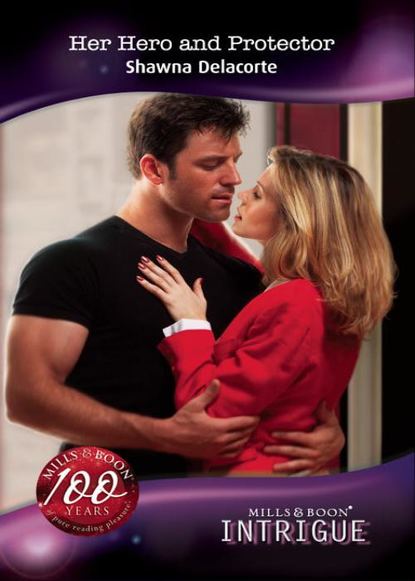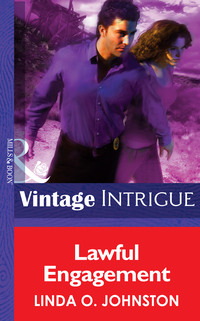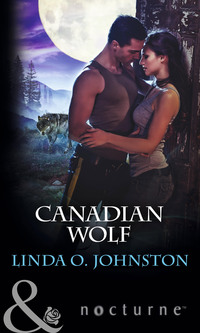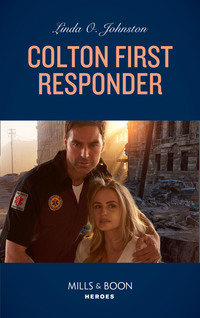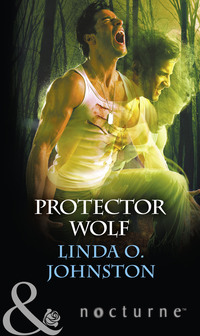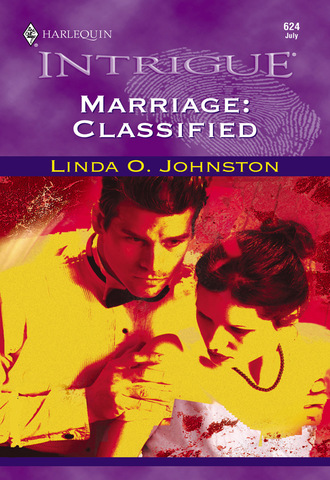
Полная версия
Marriage: Classified
It had been part of their plan.
“Jordan?” A female voice interrupted his thoughts. It was June Roehmer. She was alone. Jordan felt his features freeze in the fury before the storm; he had told her that she could not leave Sara alone for a moment. She obviously knew what he was thinking, for she said hastily, “Don’t worry. Honest. Sara’s fine. She’s out in the car. Ramon is keeping an eye on her.” She hesitated. “I told her about Stu. She didn’t remember him, but people here will talk about him today.”
“You’re right,” Jordan acknowledged. “I was going to tell her before things got started, but I’m glad you beat me to it.”
After all Sara had been through, he had wanted to protect her from this as long as possible, then break it to her in a manner least calculated to deliver another blow. No good way of presentation had come to him, and he had probably waited too long.
The problem had now been taken from him.
“How did she handle it?”
June shrugged. “Bravely, the way she has dealt with all of this. Is it all right to bring her in?”
“Yes,” Jordan said. “In fact, I’ll go get her.”
Sara’s current sitter, Ramon Susa, was June’s patrol partner. He had always seemed a little light in the brains department to Jordan, but heavy in Academy-learned police procedure. He was probably as good as anyone for guarding Sara—at least in public. He had been Stu’s friend, but there were rumors that they’d had an argument before Stu was killed. Jordan still considered him as much a suspect in Casper’s murder, too, as anyone else.
Outside, dozens of cars were beginning to park along the church’s wide circular driveway. Many were police patrol cars from Santa Gregoria and other towns all over central California. Their occupants, most in uniform, spilled onto the pavement.
Jordan spotted Ramon, a clean-cut young Latino in uniform, standing near one of the black-and-white police cars. He was leaning down toward the passenger window, apparently conversing with the occupant.
“Hello, Ramon,” Jordan said as he reached them. “Thanks for watching Sara for me.” He opened the car door. Strain shadowed his new wife’s eyes, and her pale complexion contrasted vividly with the black, slightly wavy hair that hung loose to just below her shoulders. She let him help her from the car. “Come inside, Sara.” He kept his voice gentle. She didn’t say a word as she stood, but shot him a half smile that somehow looked devastated. “June told me you know about Stu now,” he told her. “I was going to tell you here, but…” He allowed his voice to trail off.
She nodded slowly. “I suppose everyone else here knows, so it’s a good thing I do now, too.” She hesitated. “And my mother?” she asked.
“She’s gone, too, Sara,” Jordan said gently. “She died in an accident when Stu and you were kids.”
“I see.” There was no measuring the depth of the pain in her voice, so Jordan didn’t try.
He couldn’t help glancing at the spot where the bandage still lay beneath her hair. How badly did her head still hurt? He kept his arm tightly around her slender shoulders, steering her through the growing crowd. She felt slight against him, but he was still aware—much too aware—of her feminine contours beneath her fitted jacket and flowing suit skirt. When she stumbled once, he kept her from falling.
She glanced up at him and he wanted to erase the gratitude he saw there. It was his fault that she was about to bury her father. “We’re nearly there,” he growled. He made himself ignore the bewildered tilt of her head at his unkind tone.
The first person to approach as they stepped inside the church was Carroll Heumann. Of course. “I’m sorry for your loss, Sara,” he said, his voice gruffer than usual. Maybe he meant it, Jordan thought. “And that you can’t remember who did it,” he added.
She winced, and Jordan wanted to slug the man. “Me, too,” she said softly. “But the doctors assured me that my memory will come back.”
“Someday,” Jordan interposed as several others on the Santa Gregoria police force joined their small group. “It might take years before she can remember most things. If trauma caused her amnesia, she may never fully recall the event that led to it.”
He still held her shoulders, and he could feel her stiffen. “But I—”
He would have interrupted her protestations with a stronger comment, except that June did it for him. “It’s all right, Sara,” she said. “We’re all working on it. You just take care of yourself and let us catch that miserable insect of a serial killer who’s done this to your family.”
“Serial killer?” Sara looked up at Jordan with surprise. “I didn’t realize…Then he—or she—has done this to others, too?”
He nodded. “We’ll talk about it later. Right now, it’s time to go sit down in the chapel.” He darted a glance at June, who took Sara’s hand.
“We’ll be with you, Sara,” she said. “Won’t we, Ramon?”
Her partner nodded. “All of us are behind you, Sara.”
People spoke in low tones as they took seats on long wooden pews facing the pulpit. The closed casket had been moved there. It now lay on a pedestal surrounded by flowers whose fragrance flooded the front of the room.
Jordan walked with Sara as June and Ramon preceded them up the aisle to the front row, where they arranged themselves to Sara’s left. Jordan didn’t sit, not at first. He scowled as he noticed a couple of reporters he’d run into before in the five months since he had been in Santa Gregoria: an anchorwoman from the Channel 8 news, along with her cameraman, and a reporter with the Santa Gregoria Intelligencer. Though he knew it wasn’t reasonable, he wanted to rush over to them and bodily toss them out. This wasn’t a news spectacle; it was a dignified memorial to a man who had deserved to live much longer. The hordes of media, local and national, had been instructed to stay outside. But he would only make the situation worse if he confronted them.
Instead, he sat beside Sara. He took her small hand. It was icy-cold and trembling.
“We’ll get through this, Sara,” he said, looking straight into her moist hazel eyes. “I promise.”
But then he recalled another promise he had made to her—was it only four days earlier? He had promised to love and honor her, to cherish her as his wife.
His promises weren’t worth a damn, he thought.
Chapter Three
Jordan’s sweet attentiveness was nearly Sara’s undoing. As she sat beside him in the pew, she ducked her head, unwilling to allow everyone to see her tears.
“Hold on, Sara,” whispered his voice into her ear. Its deep vibration sent shivers of awareness through her. Jordan was here for her. He was her husband. He must love her very much.
And she despised herself for not remembering the deep love she must have for him to have married him. For now, she felt mostly gratitude toward him and a cognizance of his sensuality that had no business here and now.
“I’m fine, Jordan,” she told him, and made her crying stop. She smiled at him stoically, pretending not to see the sympathy in his dark blue eyes.
She wept more, though, when the pastor began the service. But much of her sorrow was not because she missed her father. Instead, it was because she missed whatever memories of him she should have.
A lot of people rose one at a time to face the packed church and give testimonials about Casper Shepard. Sara recognized only a few—those who had visited her in the hospital or who had introduced themselves here: Carroll Heumann, for one. She’d considered the man abrupt with her, but he had apparently thought highly of her father. She believed it when he said he would miss Casper.
Lloyd Pederzani was another person Sara recognized. About fifty, with a gaunt face but kind brown eyes, he had come to her hospital room the evening of her admission. He’d introduced himself as the town’s medical examiner, a practicing physician, and a very long-time family friend. He’d looked at her chart, asked how she was feeling and both shaken his head and commiserated about her loss of memory. Then, he had attempted—though poorly—to cheer her up with bad jokes.
Now, Lloyd, in a dark brown suit that bagged at his shoulders, was somber as he described how long Casper and he had been friends. How much he was going to miss the guy who’d called him out of bed at all hours of the night to discuss a new case—though that was certainly one aspect of their friendship he wouldn’t miss. His comment drew a laugh from the crowd.
Jordan rose, too, to speak about her father. Her husband remembered the man who had raised her brother and her after their mother had died in an accident years ago.
Sara didn’t. That only made her feel worse.
Even the mayor of Santa Gregoria, Pauline Casey, gave the eulogy. Mayor Casey was a slender, older woman with hair the shade of iron—which matched the fist with which she appeared to rule Santa Gregoria, the way she described it. But she spoke fondly of Casper Shepard and how he had given his all to try to make their community safe. She did, however, note that he had not been successful and vowed that whoever succeeded him as police chief would have to make a strong effort to see that no one ever got away with murder here again.
A noble goal, Sara thought. One she hoped would be met. But she shared a dubious glance with Jordan. He winked at her encouragingly, and she attempted a smile.
Sara was glad when the service was over, but then it was time to follow Jordan, Carroll, Lloyd and the other pallbearers outside.
She asked June about the older pallbearer who seemed unashamed of the tears rolling down his grizzled cheeks. He was wrinkled and gray-haired, and wore an unfamiliar uniform that was too small at his rounded middle.
“That’s Dwayne Gould,” June whispered. “He’s a driver for the medical examiner’s office. Your father was always kind to him.”
Though grateful for June’s supportive presence beside her, and Jordan’s when he rejoined her, Sara managed just fine, even surviving the lowering of the casket into the newly dug grave.
Afterward, she stood at the graveside beside Jordan, accepting condolences from unfamiliar mourners who apparently knew her well. Jordan introduced many people, apologizing over and over on her behalf. It was not her fault she didn’t recognize even those she had known for years, he said; it was a result of her amnesia.
She wanted to strangle the tall, smooth-talking man beside her. During a lull in the surging line of mourners, Sara turned to Jordan. “Please don’t keep telling people about my loss of memory,” she whispered. “I feel bad enough about it, and if anyone should apologize about it, I should.”
“We discussed this before, Sara,” he hissed as the line began to move again. “You’ll be safer if everyone knows you can’t remember anything. And I intend to keep reminding them so it’s sure to get to the ears of the killer.” And once more, when he introduced her to someone she probably should have recognized, he made reference to her amnesia.
This time, she just gritted her teeth and smiled. She knew he was just trying to protect her.
Why didn’t that make her feel any better?
WAS SARA’S AMNESIA REAL?
The Executioner watched Jordan Dawes touch his new wife in public, making a display of his feelings for her.
The Executioner listened, too, for any indication that Sara’s loss of memory was a lie.
Of course The Executioner realized that Dawes was trying to protect his pretty wife. The hot-shot Texas Ranger who had so recently come here to Santa Gregoria might have convinced Sara to feign amnesia.
If it were a ploy, it wouldn’t work. The Executioner would make an example of Sara and Dawes, then go ahead with other assassinations.
But to continue, The Executioner had to again do whatever was necessary to prevent being caught.
The Executioner had thought it a master stroke to kill Casper Shepard at his own daughter’s wedding. But then, each of the assassinations was sublime.
Too bad Sara had followed Casper unexpectedly into the room. Now The Executioner had unfinished business with Sara. Business that needed immediate resolution.
Oh, if Sara truly recalled nothing, perhaps The Executioner would allow her to live. The Executioner had already spoken with her, and she had professed her lack of memory without the slightest hesitation.
But if she really did remember…
Then Sara Dawes would be The Executioner’s next piece of superb work.
THE CROWD was beginning to thin. Clouds had started to roll in, chilling the air a little and casting an even more depressing pall on the day. Sara turned on the paved path—and noticed, for the first time, the granite markers on the graves beside the newly dug one for her father.
The nearest read, “Eleanor Markham Shepard, Beloved Wife and Mother,” and gave dates of birth and death. Her mother? Sara couldn’t be certain…but she thought so.
Beside it was another marker that was shorter and not as weathered: Stuart Markham Shepard. Stu. Her brother.
He had been only thirty-three when he had died three years earlier.
How old was she now? She wanted to break something, scream out loud, for she didn’t remember even something as simple and personal as that. She took a deep calming breath. She would ask Jordan. He would know. And she was certain that Stu had been her older brother.
She stared at his grave…and closed her eyes as a vision of another funeral shimmered before her. She was sobbing. Her father was there. Jordan was there.
And Stu…Stu had been murdered. The Santa Gregoria police force was there en masse, too. She had a sense of being stifled. Of wanting to stab someone, as Stu had been stabbed. Of wanting to circumvent laws, and law enforcement, which had been so important to all their lives, to avenge him, no matter how—
And then it was gone.
“Sara, are you all right?” It was Jordan. His arms were suddenly around her again, holding her upright. She realized she was swaying. Her mind swirled dizzily and she knew that, without Jordan’s strength supporting her, she would have fallen to the ground.
She leaned into him, appreciating his powerful presence. “I—I’m fine,” she lied. She moved even closer, pulling his head down so she could whisper into his ear, “Jordan, I just remembered—”
“I’m sorry you’re not feeling well, darling,” he interrupted. His words were slow and insistent, as though he were speaking to a developmentally challenged child.
She stiffened, then realized he might just be protecting her…again. She glanced around. Though quite a few people still milled around the cemetery, no one was close enough to hear what she said. Why didn’t Jordan let her speak?
“Jordan,” she began again, “I think my memory might—”
Once more he didn’t let her finish. “We’ll talk later,” he whispered. Out loud, he said, “There’s a little reception in memory of your father now, right inside the church. We won’t stay long. You need some rest.” He started to move her along the paved path, toward a few groups of people and away from the graves.
She let him, though she now wanted to shout at Jordan, too. She appreciated that he was trying to keep her safe. But there was such a thing as being overprotective.
The churchyard was old, full of overhanging trees and large family grave markers. Under other circumstances, Sara would have found it charming.
Now, though, its quaintness only added to her depression. Her family was buried here. Everyone—except for Jordan and her.
And someone had tried to kill her.
Inside a hall within the church, carafes of coffee had been set on tables laden with sliced fruit, donuts and cookies that looked homemade. “I’ll get you something to eat,” Jordan told her.
“Thanks, but I’m not hungry.” In fact, the thought of trying to get any of that sugar down made her stomach roll.
But Jordan caressed her face gently with the side of his hand. The gesture touched her. “You need to keep up your strength, Sara.” He took her over to where June and Ramon stood. “Sara’s feeling a little peaked,” he said. “Keep an eye on her, will you, while I gather some refreshments?”
“Is all of this getting to you?” June’s tone was sympathetic. “I’m so sorry, but it’s no wonder, with everything that’s happened.” She looked less pixieish when her eyes reflected sorrow.
“You’re a brave lady,” Ramon said. His expression was admiring. “Tell me what I can do to help, all right?”
But Sara had nothing to say. There were several things she could think of that would help her, but none that Ramon, kind as his offer was, could hand to her.
The first was her memory. The second was the capture of her father’s killer. Her brother’s, too. They were probably one and the same.
She glanced at Jordan. Holding a foam plate half filled with food, he was conversing with a couple of uniform cops she didn’t recognize.
She turned toward June and Ramon, and found them engrossed in a conversation with one another. They spoke in hushed whispers. June gazed at Sara, then looked guiltily away.
They were talking about her. Didn’t they think she was bearing up sufficiently under all the strain? Or did they believe she had made up the amnesia?
She didn’t care. Even though she had experienced one small but significant snatch of memory in the last few minutes, she really couldn’t remember much. And she didn’t particularly like the way she was handling the stress, either.
Right now she felt as if the entire funeral, all the guests, were closing in on her. Creating a clutching anxiety deep inside that she needed to flee.
She surreptitiously glanced again toward her temporary keepers, June and Ramon. Neither was looking at her. Jordan, too, still had his attention focused elsewhere.
Sara took the opportunity to slip out of the church.
It was still light outside. There were plenty of people around. Sara needed to be alone.
She wasn’t stupid, though. Someone had killed her father and had attacked her. She needed to stay in a crowded place where no one would dare accost her. She didn’t go far from the church, choosing to stand in an area that appeared to be one of the cemetery’s oldest—judging by how weathered the tall stone markers that nearly surrounded her appeared. The main driveway to the church was behind her; several people were still milling around the parked cars, including media types with cameras, and uniformed cops.
She stood for several minutes enjoying the solitude, despite her sense of incompleteness. She racked her brain, trying to remember more about Stu’s funeral—the first significant memory she’d had.
Why had he been killed?
After a while, she felt a few raindrops. She looked up at the darkening sky and sighed. Coming outside had not been such a great idea, after all. She could go back in, find Jordan and ask him to take her home.
She took a few steps toward the church—but someone grabbed her. Something was shoved into her mouth, and she was wrestled sideways and to the ground, facedown, her arms beneath her.
She tried to scream for help, but the gag prevented her from doing more than make a frightened, incoherent noise. What was wrong with all those police? Hadn’t anyone seen what happened?
Jordan. Where was he? He’d wanted to protect her. He would save her.
Her assailant kept a knee in the small of her back, pinning her down. He—she?—was strong. Or was it that Sara, scared and still recuperating from her last attack, was weak?
Would she be killed this time?
The right side of her face pressed into earth that was still hard, for the rain was hardly a drizzle. Sara swallowed a whimper. She wouldn’t give her attacker the satisfaction of seeing how scared she was.
Where was Jordan?
“Now, Sara Shepard,” said a voice that was low and raspy and clearly disguised, “you will answer my very simple questions with a nod or a shake of your head. If you do well, I will let you go and you will be fine. If not, you will be executed prematurely, like your father.”
Sara felt herself stiffen but tried to stay absolutely still—except that she could not prevent her breaths from coming too fast. Something…something niggled at the back of her mind. She had been in this position before. Why? It hadn’t frightened her—then.
“Do you understand?” asked the voice. She heard a few drops of rain softly strike the person’s clothing. “Nod or shake your head.”
Sara made herself give an abrupt nod. She suddenly felt terribly alone. Jordan wasn’t coming. He would save her if he knew, but he was inside the church, talking and eating and laughing. He would feel awful when he found her body. But she was on her own.
“Good. Now, tell me—did you see who killed your father?”
That was a question she couldn’t actually answer with a yes or no. She didn’t know. But what she was certain of was that she didn’t remember.
She took the safest course and shook her head in the negative.
“You’re lying, Sara Shepard.” The knee in her back dug in harder, making her gasp in pain. Through her agony, she thought she heard a small sound, like keys jingling—or was it merely the unfamiliar rasp of her own terrified breathing?
Something else teased at the corners of her mind, then disappeared.
“Or should I say Sara Shepard Dawes?” the voice asked with a sarcastic laugh.
She nodded vehemently to that, although it probably was not a question her attacker expected her to answer. But the thought once more of Jordan in the church gave her sudden courage. He would have noticed her absence by now and come looking for her.
Wouldn’t he?
The voice stormed, “Have you really lost your memory?”
Again she nodded with no hesitation, for it was the truth.
That knee in her back. This position on the ground—She had taken self-defense courses! Of course she had. Even as a police dispatcher, she had been required to learn the rudiments.
The response came back to her now. Whether it was what she had been taught, or her own take on it, she didn’t really know.
“Are you lying, Sara?”
She shook her head carefully, as if too abrupt a movement now would cause her to forget the little bit she had, with so much difficulty, brought back to mind.
She moaned, made her body tremble, and then went limp.
“Sara?” The voice remained disguised, though it sounded a little alarmed.
She didn’t move. She just waited, listening to the increasingly heavy rain, listening to her attacker’s raspy breathing. Her clothes were damp enough now to stick to her, but she could do nothing about it.
Her assailant remained on her back, though the pressure eased a little. “Sara?” The tone went up a little more.
And then she made her move. Quickly she arched her back, then rolled. It worked! She heard the thud on the dampened earth as the person fell off her.
She pulled herself up into a crouch, prepared to do hand-to-hand combat if necessary. But it wasn’t. All she saw of the person was the back of a long, black raincoat, hood raised, as it disappeared behind a tall gravestone.
Конец ознакомительного фрагмента.
Текст предоставлен ООО «ЛитРес».
Прочитайте эту книгу целиком, купив полную легальную версию на ЛитРес.
Безопасно оплатить книгу можно банковской картой Visa, MasterCard, Maestro, со счета мобильного телефона, с платежного терминала, в салоне МТС или Связной, через PayPal, WebMoney, Яндекс.Деньги, QIWI Кошелек, бонусными картами или другим удобным Вам способом.




